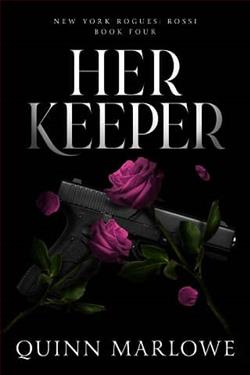Page 6 of Healing Hazel
Now that the immediate shock had passed, reality set in, and a surge of terror washed through her, leaving her lightheaded. She and her friends had come close to death. And Captain Bryant was still unconscious. What was she to do? She crossed her arms against the chill that went over her. She did not speak the language, she did not understand what had happened to explode the train track, her two companions were in need of medical care, and she had no way of knowing how to transport them to a hospital or even in which direction one might be found. She didn’t know when or how they would return home nor, more immediately, what to do for food and shelter. The entire circumstance felt so helpless that Hazel could only stare at the scene as her mind turned through scenarios and her worry grew. Panic threatened, and she fought to keep herself calm, closing her eyes and breathing in and out steadily.
“Hazel.” Nella poked at her arm. “What are you doing?”
“I’m so sorry.” Hazel blinked. She turned to adjust the travel bag behind Nella’s back. “Are you uncomfortable? What can I do?”
“All of these people”—Nella motioned around to the train passengers—“they need help.”
Hazel glanced around her, taking in the wounded people in the clearing. “I don’t know—”
“You helped the captain and myself,” Nella interrupted before Hazel could voice her hesitance. “You are very capable.”
“But I only did what you told me,” Hazel said. “I—I’m not a nurse.” Embarrassment heated her cheeks. “I haven’t completed my training.”
“You can do this.” Nella squeezed her hand. “They need you.”
Hazel opened her mouth to argue but stopped when the steward who had brought their meal stumbled by, holding his arm. Blood dripped from between his fingers.
She glanced at Nella, and the older woman motioned toward the man.
Hazel rose, stopped the steward with a hand on his uninjured arm, and pointed to a rock for him to sit near Nella.
“Examine the wound,” Nella instructed.
Hazel helped the man pull off his jacket. She tore his sleeve open, exposing a long cut just beneath his shoulder. “It needs stitches,” she muttered.
“For now... ,” Nella started.
“Apply pressure. Stop the bleeding,” Hazel finished. She found a shirt lying on the ground, brushed it off, and held it against the wound. Then she took the steward’s hand, showing him where to hold the shirt, and motioned for him to press tightly. She put his coat over him, wanting to keep him warm.
Nella nodded her approval.
A woman with a child cried out, and Hazel hurried over to her. The little girl clasped her arm closely against her chest. Her wrist was purple and swollen. The bone may have been broken. Hazel sat the little girl down near Nella, helping her lean back against a tree.
“You cannot set the bone yourself,” Nella said. “So you must immobilize it.”
Hazel found an apron from the dispersed clothing and tore it to make a sling, wrapping the wrist. She motioned for the little girl to stay still and not move her arm.
When Hazel returned to Nella, she saw her friend’s face was becoming paler. She brushed a curl off the woman’s forehead, noticing how cold her skin felt. She remembered learning about shock and thought Nella was exhibiting symptoms. “You need a doctor’s care.”
Nella leaned back against the tree. “For now, there is nothing to be done.” She closed her eyes.
Hazel found a wool coat and a pair of trousers and laid them over Nella to keep her warm.
“Help the sick, Hazel,” Nella said in a quiet voice. “That is a nurse’s calling.”
Hazel recognized Miss Nightingale’s words. She’d heard them often enough when the famous nurse addressed the nurse trainees. “But I’m not...” Seeing that Nella had fallen asleep, her words trailed off. She looked around the wreckage, feeling useless. Nella knew just what to do, but Hazel felt unsure. What if, in her attempt to help, she made things worse?
A throbbing came from her palm, and Hazel glanced down, surprised at the cut in her hand. She had a vague recollection of slicing it on a piece of glass and saw that the wound had not begun to close. She found a handkerchief in her handbag and wrapped it around her hand, using her teeth to pull the knot tight. The small action gave her a bit of confidence. Surely a little help was better than none. And anything was better than sitting helplessly. She would do what she could.
Over the next hours, she gathered more clothing and a few blankets to cover patients who appeared cold. Then, with the help of the young girl’s mother, she bound a slashed thigh. A man with a broken nose she ordered to sit quietly and gave him a wad of cloth to hold against the bleeding as she tied a strip of fabric around it to keep it in place.
Luckily, the train had plenty of water, and she, along with some of the other passengers, distributed it to those who couldn’t retrieve it themselves. Some—the burn victims, in particular—were injured far beyond Hazel’s abilities to help. She offered water and soft words but had little more to give.
She was pleased to see that the men who had moved Captain Bryant and Nella from their car had recruited more to their cause to move others from the damaged train.
Hazel checked often on Captain Bryant, who still hadn’t woken, and Nella, who drifted in and out of sleep. Far from feeling cold now, her friend had developed a fever. Hazel dabbed Nella’s face with a cool cloth.
She changed the dressing on Captain Bryant’s wound again, seeing that the bleeding had at last stopped. As she retied the scarf around his head, Hazel heard a cheer. She stood, looking around for the cause of the passengers’ sudden excitement and saw one wagon with a canvas covering approaching along the road beside the train, followed by another. The drivers and passengers each wore a band around their upper arms, bearing a bright-red cross. An ambulance crew.















